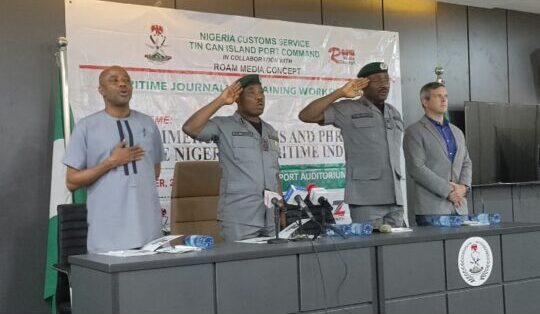
The Comptroller General of Customs (CGC), Bashir Adeniyi, has called for the adoption of a more accurate and technology-driven reportage of maritime issues to enhance accountability and efficiency in the sector.
Adeniyi made the call on Friday at the 2024 Maritime Journalists Training Workshop in Lagos.
Represented by Comptroller Dera Nnadi, Area Controller of Tin-Can Island Port, Adeniyi said that accurate reportage would help reduce corruption and improve the overall efficiency and integrity of customs processes.
He emphasised the importance of trade facilitation, transparency and technological advancement in customs operations.
The CGC said that the workshop, initiated by Comptroller Nnadi, was to equip maritime journalists with updated skills and knowledge to navigate the evolving landscape of customs and trade reporting.
Adeniyi said that the maritime sector’s transformative journey was fueled by technological advances, changing trade patterns and regulatory reforms.
He highlighted the workshop’s focus on fostering an understanding of essential industry vocabulary, enhancing operational transparency and ensuring regulatory compliance.
The Customs boss encouraged participants to actively engage, share insights and raise questions, reaffirming the critical role of maritime journalists in educating the public and setting industry standards.
He said that terminology of the industry should evolve in line with customs operations, trade compliance, and international logistics.
The Deputy Manager, Mediterranean Shipping Line (MSC), Mr Jacob Iosso, said that it was necessary for the company to collaborate with customs to train media for clearer reportage.
The Customs Area Controller of Apapa Command, Comptroller Babatunde Olomu, commended the effort of the customs management, the MSC shipping and Comptroller Dera Nnadi for organising the training for media.
Olomu urged media to use the opportunity to increase the knowledge acquired during the training to improve on their reportage.
The Chairman of the Planning Committee of the customs media training, Mr Innocent Orok, acknowledged the logistical challenges in organising the event due to prevailing economic conditions.
Orok reiterated the importance of continuous training and empowerment for journalists, noting that the workshop sets a new standard for maritime media training.
He further commended Comptroller Nnadi’s commitment to the media’s advancement, recalling Nnadi’s role in addressing outdated narratives and encouraging the specialisation of maritime media professionals.
Orok said that the workshop would not not only support journalists in their professional growth, but also serve as a template for future industry-focused training sessions.
In his Presentation, Adeiza Ibrahim, Chief Superintendent of Customs (CSC) and Assistant Technical Supervisor at Tin-C Island Port Command, underscored the importance of understanding modern commercial terms in 21st-century customs operations.
CSC Adeiza highlighted how global trade dynamics, technological advancements, and evolving regulatory frameworks had transformed customs operations, increasing the need for accurate communication among stakeholders.
“Precise language is essential in customs operations to mitigate legal disputes and streamline processes.
“Terms like Harmonised System Code (HS Code), Bill of Lading (BOL), and International Commercial Terms (Incoterms) are foundational to current customs practices.
Throughout the session, Adeiza elaborated on how terms like “FOB” (Free on Board), “CIF” (Cost, Insurance, Freight), and “VAT” (Value Added Tax) impact trade responsibilities, documentation requirements and customs compliance.
“Under the role of technological advancements in simplifying customs processes, there is need to understand the introduction of the Unified Customs Management System, known as “B’ Odogwu”, designed to enhance border management and transparency in Nigeria,” Ibrahim said.
He applauded the organisers’ efforts to equip maritime journalists with the knowledge to report accurately on the complexities of customs and trade operations in a globalised economy.
The event included a recognition segment for veteran journalists who have contributed significantly to shaping maritime policies and programs in Nigeria.
Sponsors such as MSC and Zenith Bank were also acknowledged for their support in making the event possible.
As the session concluded, Comptroller Nnadi expressed gratitude for the backing from the CGC, ACG Saidu Yusuf and other stakeholders.
He reaffirmed his commitment to supporting initiatives that advance maritime journalism and industry transparency.















